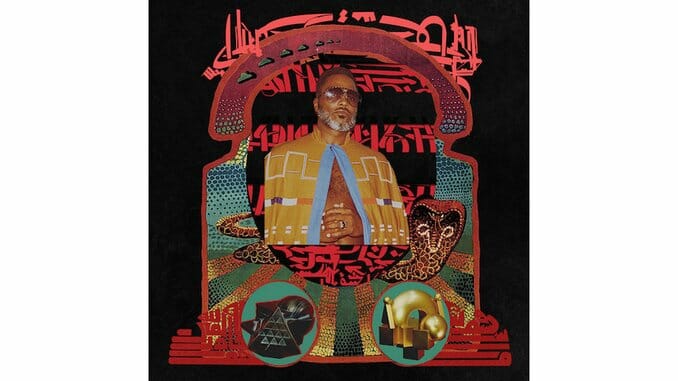Shabazz Palaces Bring Visionary Hip-Hop to Earth on The Don of Diamond Dreams
Diamond Dreams threatens to be Shabazz Palaces’ funkiest album, but it also turns out to be the group’s most uneven
Music Reviews Shabazz Palaces
Few rap stars on earth have enjoyed a more remarkable second act than Ishmael Butler, though the rapper’s recent output may leave you questioning whether he even is from earth. Twenty-five years ago, Butler was “Butterfly,” the unofficial leader of hip-hop trio Digable Planets, whose only two albums—1993’s Reachin’ (A New Refutation of Time and Space) and 1994’s Blowout Comb—remain essential artifacts along the cosmic pathway between ’90s rap and ’70s jazz. Butler laid low for years, only to reemerge a decade ago with Shabazz Palaces, his exploratory hip-hop collaboration with percussionist and multi-instrumentalist Tendai “Baba” Maraire.
Across five full-length albums, the project has proven to be more prolific than Digable Planets, and quite a bit headier, too, ditching samples for live instruments and foregrounding the cosmic vibrations that have long hovered around Butler’s music. Even the duo’s album titles—Quazarz: Born on a Gangster Star, The Don of Diamond Dreams—resemble scribbles from Sun Ra’s diary.
Diamond Dreams, the first Shabazz Palaces release since a pair of 2017 albums examining a fictionalized America from a distant planet, contains the group’s most expansive and freeform material to date. It seems to exist in an alternate universe where Funkadelic pastiches and Outkastian alien synths have defined the past 20 years of hip-hop.
On “Ad Ventures” (say the title aloud), a buzzing engine of low-end funk worthy of the group’s 2011 masterpiece Black Up, Butler is a freewheeling travel-guide, beckoning us along on his cross-continental explorations: “I ride on light / My endeavors find me playing through the night / And basking in tight / Ever hurtling through space on a flight.” (The track is also meant as a tribute to The Black Constellation, the rapper’s loosely defined cross-disciplinary collective of artists.) Butler’s rhymes carry a stream-of-consciousness sense of promise, and the song is all the more alluring for having arrived at a moment when traveling for pleasure is virtually impossible.
On the surrealist braggadocio of “Chocolate Souffle,” meanwhile, he’s a breathless shit-talker (“You a data rat / I’m a black slang acrobat,” “You’re a scroller / I’m an explorer”). With its channel-panning chirps and bloops, “Wet” boasts an arrangement disorienting enough to make the song’s strange refrain—“I just like the water cuz it’s wet”—sound like cosmic decree, culminating in a climax that describes “speed demons surfing across the thick green felt.” Butler’s imagery hearkens back to the afrofuturist visions of George Clinton and Sun Ra while also slotting in with the new black surrealism defined by films like Get Out and Sorry to Bother You. (Shabazz Palaces has always seemed to negotiate between the distant past and the distant future, as on 2017’s “30 Clip Extension” and its temporal channel-surfing between 1968, 1974, 2017, and 2064.)
With its woozy synth textures, The Don of Diamond Dreams threatens to be Shabazz Palaces’ funkiest album, but it also turns out to be the group’s most uneven. Like Outkast’s Stankonia, it takes a turn towards extended groove instead of rhyme in the final third, but not even a nimble saxophone solo or two (performed by Carlos Overall) can rescue repetitive vamps like “Money Yoga” or closing track “Reg Walks By The Looking Glass,” which vacillates between two chords for six lethargic minutes without leaving much of an impression. The two songs amount to a combined 13 minutes of the album but lack the energy or spirit of the duo’s best work. In between them, Butler assumes a family-man role on “Thanking the Girls,” a downtempo salute to the beloved women in his orbit.
Despite ending on a yawn, Diamond Dreams is immersive and solidifies Shabazz Palaces’ stature as one of the few hip-hop projects to emerge in the 2010s and create a wholly distinctive genre unto itself. Its intergalactic textures don’t resemble earth, but that’s a welcome escape at a historic moment when earth doesn’t feel particularly inhabitable for humans.
Zach Schonfeld is a freelance writer and journalist based in New York. He contributes regularly to Paste, Pitchfork, VICE, and other publications. Previously, he was a senior writer for Newsweek.